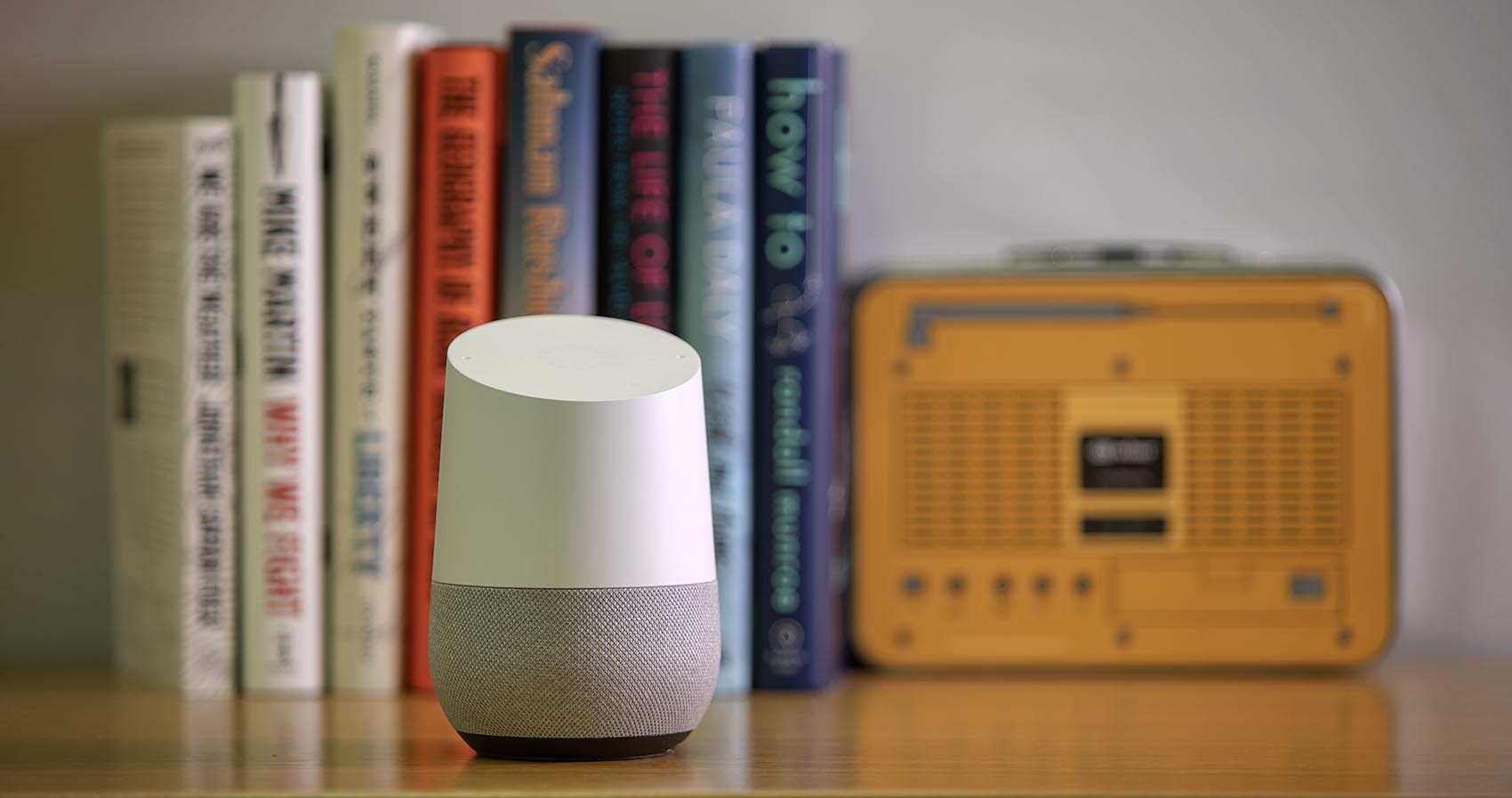Advertisement
We Asked WBUR's Audience About Smart Speakers. Here's What We Found

How is WBUR's audience using — and not using — smart speakers?
It's a question that Project CITRUS — our yearlong initiative examining on-demand audio, smart speakers and more — wanted to dig into as we begin to develop a strategy for these devices and other emerging audio platforms (more simply, anything that's not the radio). So we created a survey.
2,574
The total number of responses to our survey. We set an initial goal of 1,000 responses, so we were exceedingly pleased to see that level of participation.
Thanks to the logical flow of our survey, we were able create and analyze four groups of people:
- People who own a smart speaker and have listened to WBUR on it
- People who own a smart speaker and have not listened to WBUR on it
- People who do not own a smart speaker but are interested in owning one in the future
- People who do not own a smart speaker and are not interested in owning one in the future
We will primarily focus on that first group, where "smart-speaker owners" and "WBUR listeners" overlap in the Venn diagram. They will of course provide some of the most useful and practical feedback.
40%
The percentage of respondents who own a smart speaker.
One point of comparison for this figure is the most recent Smart Audio Report released by NPR and Edison Research, which found 21% of Americans age 18 and up own a smart speaker.
It's not all that surprising that our survey yielded a higher figure here — this is a self-selecting group of people who engage regularly with WBUR — but the fact that it's nearly double is certainly worth noting.
67%
The percentage of respondents who have listened to WBUR on their smart speakers. This was another encouraging statistic.
WBUR currently offers two ways to listen via smart speaker:
- A digital version of the live FM broadcast (aka "the livestream")
- An Alexa flash briefing that tells you the latest news
We've done some modest promotion around these, but generally it's been a soft launch. Nevertheless, listeners have found WBUR content on their smart speakers.
Of course, we'd like to boost that number even higher. It will be interesting to see if it increases when we survey our audience again.
What Do Users Think Of WBUR's Smart-Speaker Experience?
We now come to our most anticipated question: "How do you think the WBUR smart-speaker listening experience could be improved?"
Many people, we were pleased to hear, are already quite satisfied. In fact, 85% of the group said the listening experience was "excellent" or "very good." Of course, given that smart speakers have emerged as a radio replacement, this makes sense. The devices make the simple experience of listening to the radio even simpler; you say "play WBUR" and WBUR plays.
But there's also room for improvement. Some of the most common requests from listeners included:
- The ability to pause and rewind
- Better ways to find/search/browse past podcasts and shows
- Improved audio quality, especially volume
- The ability to pick up a listening session where it left off
- More and better instructions/documentation about how to access and use WBUR content
The Varieties Of WBUR Smart-Speaker Listeners
As we read through the survey's free-form responses, we saw several patterns emerge around how people are using their smart speakers to listen to WBUR. We loosely defined a few listener types, and also highlighted specific comments that help illustrate each group's smart-speaker attitudes and habits. (Note: Some respondent comments have been lightly edited for clarity and style.)
Radio Replacers
A sizable group of WBUR smart-speaker listeners see the device as a cutting-edge replacement for their traditional radio. They use it primarily — in many cases exclusively — to listen to the livestream, which, again, is simply the FM broadcast in a digital format.
Radio replacers appreciate the convenience — "no hands!" — as well as the improved fidelity — "no static!" — offered by their smart speakers. At the same time, many reported frustrations at the discrepancies between the smart speaker and radio experiences; for instance, a recurring advertisement (what we call a "preroll") precedes each livestream listen, something you'd never hear on the radio.
- "For me a smart speaker is a huge improvement from just turning on your transistor radio."
- "I literally only use [it] to play WBUR, and keep it muted at all times other than to say, 'Hey Google play WBUR.' "
- "Hands free convenience allows me to multi-task. I like being able to tell Alexa to play [WBUR] while I'm across the room doing something else."
- "I feel like I use my smart speaker just like I used my radio for many years when it comes to WBUR."
- "[There should be] less advertising at the beginning [of the livestream]. I don't have to listen to extra advertising when I first turn on my radio; why do I have to when I use a smart speaker?"
- "[I enjoy] getting WBUR without static."
- "I have neither the time nor the inclination to learn about all the things [my smart speaker] could do."
- "I am actually listening to WBUR on Alexa as I fill this out."
Advertisement
We hypothesize that this user is mostly uninterested in digging deeper into their smart speaker's capabilities, or has attempted to do so and given up. In short, while the hardware has changed, the end goal — "I want my WBUR!" — remains the same.
Expats
Smart speakers allow people to listen to WBUR anywhere — a distinct advantage over traditional radios. We heard from several WBUR listeners who live outside of New England and who appreciated the devices' capacity to take geography out of the equation.
- "I get to listen to a variety of stations no matter where I live ... including WBUR. I listen to it from North Carolina."
- "[I like having the] ability to listen to a station like WBUR in Iowa."
Power Users
Whereas radio replacers like to "set it and forget it," power users engage with their smart speakers in a deeper and more sophisticated manner.
Their survey feedback suggests they are curious about their smart speakers and are trying to get the most out of them. They enjoy interacting with WBUR, but also think the experience could be enhanced.
- "I'd like to be able to play the program currently in progress from the beginning the way you can on the WBUR app on the phone."
- "I wish I could pause or rewind when I miss something."
- "It'd be great to be able to play the most recent version of a show (e.g. 'On Point,' 'Radio Boston,' 'Wait Wait') easily. Now, I'd go to my podcast app on device and then play through the Bluetooth speaker."
- "I haven't noticed it recently, but it used to be that starting a stream would always kick off an ad before the story started, so if I was listening in my car then came in and started it, I'd miss more than I had to of the story."
Intrigued Yet Frustrated
Many users expressed that smart speakers can't quite meet their expectations. These expectations could merely be perceived by the user, or explicitly promised by the manufacturer. In some cases, this means users are turning to their smart speakers less, despite having an earnest curiosity about the technology and its potential uses. This frustration, in turn, thwarts deeper engagement with WBUR content.
- "It's very hard to get my speaker to play podcasts. It has a hard time finding the right one so I usually don't bother."
- "I don't think most people know all that they can do [with their smart speaker]. I learned some things just filling out this survey. Giving people a guide of all you can do would be great!"
- "I often have trouble getting it to play the episode of 'On Point' I want to listen to. It either goes back to something that was interrupted last week or plays the latest episode. I also often have to ask for the podcast rather than just playing 'On Point.' Sometimes that's recognized, sometimes not. Same with 'Here & Now.' "
- "[I wish my smart speaker could] understand me more clearly."
- "Sometimes, as when I want to listen to 'On Point' or 'Here & Now' or something specific, it just acts dumb."
- "Often [doesn't] get the right answer or an incomplete answer to a question — or doesn't understand what I'm asking."
Users' Primary Smart-Speaker Frustration? Being Misunderstood
Another open-ended question asked what people disliked about using their smart speaker. It yielded a range of frustrations, but one in particular came up over and over again: their device is unable to satisfactorily interpret a request.
We highlight this finding because it will be top of mind as we develop a more conversational and helpful experience. In other words, let's make smart assistants act like smart tools that can assist you. It calls to mind some useful tips from the BBC's voice and AI team for handling user utterances: don't keep people "stuck in error loops"; keep an interaction progressing toward the desired intent; and take the blame when it's not.
Another Major Concern? Privacy
Our survey indicates there's unease about these devices, even among active users. They repeated phrases like: "it's listening to us all the time," "they are tracking me," and "Big Brother."
Privacy concerns around smart devices and voice assistants have been well-documented (Amazon, for example, weighed in on the subject at its recent product launch event). We're also in a moment of significant tension surrounding big tech companies, data, and security more broadly. This all poses significant hurdles for public media outlets like WBUR, whose relationship with their audience is predicated upon a strong sense of trust.
A Few More Takeaways
- Amazon on top. Not surprisingly, most smart-speaker listeners who responded own an Alexa-enabled device. Google was second, and Apple a distant third. Sonos was the most popular write-in.
- Morning people. Just over 40% of smart-speaker listeners indicated they "most often use" their smart speaker between 5 a.m. and 10 a.m.
- Multitasking. The top three activities that accompany smart-speaker listening were: cooking, doing household chores, and getting ready for the day.
- Trending older. Nearly half of the survey cohort indicated they are age 55 or older. Our listeners and donors tend to be older, so this came as no surprise.
- Any demand for on-demand? We wondered if an older cohort helped explain the repeated emphasis on simply listening to the FM broadcast. After all, if you are retired, you have the luxury of listening to your favorite show when it airs. So we're curious to see if younger, busier, digital-native listeners crave more on-demand content on smart speakers.
- Ready-made focus group. Almost 600 people shared their email addresses, offering to help WBUR develop our smart-device strategy. We'll keep you posted as we gather even more feedback from this group.
- No flash in the pan. Over 20% of the core subset use Alexa flash briefings. Another 14% have heard of them. That was much higher penetration than we expected, given how little Amazon promotes them.
- Dovetailing. By asking recent pledge-drive donors to take our survey, we significantly widened our reach and more than doubled participation.
- Chef recommends! We built our survey using SurveyMonkey. We're on a free account that's less customizable, but have nevertheless been happy with the tools and granularity it's provided.
